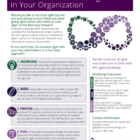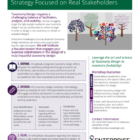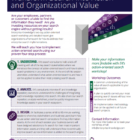In my years of Knowledge Management Consulting, one of the most critical tools in my utility belt has been the workshop. We often leverage a workshop concept as one of the initial engagements we have with a new client. I sometimes refer to this as “superhero consulting,” as our workshops often involve us flying in, helping to solve a problem or meet a challenge, and then flying off back to our Fortress of Solitude (also known as EK headquarters).
I’m a big fan of workshops for several reasons:
Value
They provide maximum impact at minimal cost to the client. I’m the first to recognize that not every organization needs, or can afford, a lengthy engagement where a team of consultants are embedded on a client site.
Impact
They provide a direct impact opportunity to point an organization in the right direction and align goals. Many of the organizations with whom we work possess the expert, conscientious, “doers” in house, and only need a limited engagement workshop to ensure they’re leveraging our experience and best practices.
Alignment
They ensure an aligned understanding and vision for goals, actions, and potential returns. The core act of getting the right people in the room is incredibly powerful. Having all voices heard and creating a shared roadmap to success powers the overall initiative and allows everyone to know each other more directly, which in turn leads to greater collaboration.
Regardless of the subject matter around which we’re running a workshop, from Agile Strategy, to Taxonomy Design, to Action Oriented Search, to KM Roadmapping we focus our workshops around providing the utmost value, impact, and alignment.
To that end, we focus our workshops to have the following characteristics:
Balanced Participation
As superhero facilitators, our mission is to ensure that all voices are heard, and that we respectfully inject our own experience and recommendations into the culture of the organization. Though we may be flying in to save the day, that doesn’t mean we’re talking more or louder than anyone else. Our role is to empower and guide the discussion.
Practical Best Practices
Our role is not to “vanquish the villain,” but to empower the organization with the approach and best practices to own that task. To that end, providing real world stories of success and failure from the hundreds of organizations with whom we’ve worked provides the practical context necessary to think workshop in real terms.
Actionable Results
One of the most critical keys to a successful workshop is ensuring that, at its conclusion, there are clear deliverables and next steps. There are many who can complete a workshop and leave people feeling good. That’s not enough. A truly impactful workshop will have clear actions, deadlines, and an accompanying view to the future (or roadmap) as a product.
Ownership
Along with those actions and deadlines, each workshop should help to identify the internal heroes and protagonists of the organization who can help to progress the roadmap.
Fun and Energy
At times I think our greatest superpower of all is infusing an organization with the excitement and energy to make real progress to address their challenges. This is possible because we truly believe in what we do and love helping organizations understand and internalize the value that could be realized if they align to address their challenges and goals.
Are you looking up in the sky for your Agile KM Superhero? Send a signal to info@enterprise-knowledge.com and we’ll answer the call.
Workshop Brochures



